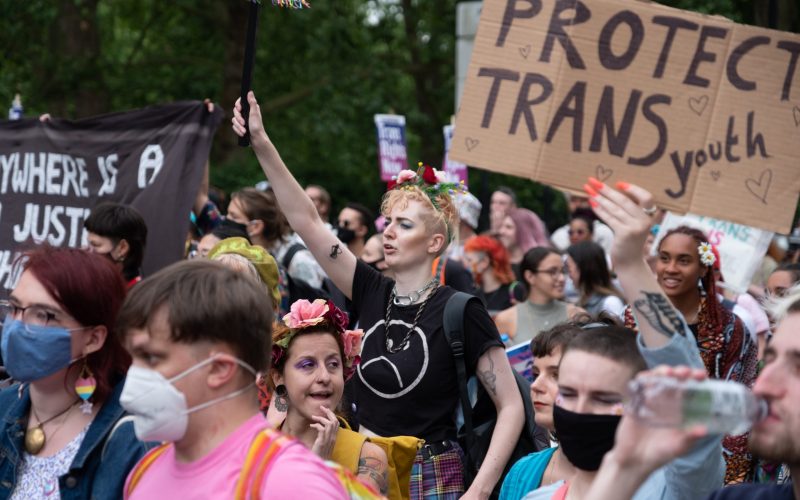By Isabel Ranney
Imagine you are in the middle of a contentious divorce with your soon to be ex. You have one child in common—an eleven-year-old named Sam—who was born biologically male but has expressed a desire to wear dresses and be referred to using she/her pronouns. Sam’s preferences were a major factor in the divorce because you permitted Sam to take physician-recommended puberty blockers, a treatment your ex strongly opposed [1].
To try to ensure that they are awarded sole custody, your spouse calls the DCS hotline and reports that you are abusing Sam. DCS takes the report, and you receive a voicemail from DCS caseworker asking to meet with you to discuss the allegations. You are now being investigated for child abuse.
This appears to be the future of child abuse allegations, at least in Texas. On May 13th, 2022, the Texas Supreme Court held that “investigations of parents with transgender children for possible child abuse could continue,” reversing the lower court decision that had temporarily halted the investigations statewide [2].
While the Texas Supreme Court’s ruling does not mandate state welfare agencies to investigate these types of allegations, it did leave it within their discretion—despite acknowledging that such inquiries may cause “irreparable harm.” Meaning the agency can decide whether it considers parents authorizing their child’s medical treatment to be child abuse–a designation typically left to the legislative branch.
What are the laws in Arizona regarding transgender children?
Like many states, the Arizona legislature recently passed bills aimed at limiting the rights of transgendered children. On March 30, 2022, Governor Ducey signed Senate Bill 1165 into law, which prohibits minors from undergoing “irreversible gender reassignment surgery” [3]. Gender reassignment surgery is defined under the law as “a medical procedure performed for the purpose of assisting an individual with a gender transition.” While the proposed bill sought to ban all gender-affirming care (i.e., hormone therapy and puberty blockers), the enacted law applies only to surgeries that are irreversible.
This legislation, like the legislation at issue in Texas, curbs a person’s fundamental right to parent by prohibiting parents from authorizing medical treatments for their children. While this is not the same thing as labeling those who permit the surgeries as child abusers, it certainly paves the way for agencies like DCS to investigate parents who encourage these treatments.
How does the Texas Supreme Court ruling affect Arizona?
What the Texas Supreme Court decision does is send a message to other states that there is an avenue for state agencies to investigate gender-affirming care as child abuse. This is an incredibly harmful message, because it seeks to label children who undergo gender-affirming treatments as “victims,” entirely removing any notion of their individual autonomy or consideration of their desires. It also seeks to punish parents who support their children exploring their gender identity and undergoing medical treatment to affirm their gender.
Given the way things have been trending politically, it is not out of the question to believe that gender-affirming care could be included under Arizona’s definition of child abuse. Under A.R.S. §§ 13-3623 and 8-201, child abuse includes the “infliction or allowing of physical injury, impairment of bodily function or disfigurement or the infliction of or allowing another person to cause serious emotional damage.” This language mirrors the argument by Texas Attorney General Paxton that gender-affirming care is child abuse because it can cause the child to sustain mental, emotional, and physical injury [4]. Evidently, if these arguments are being made in Texas, all it would take in Arizona is for there to be a policy change in how DCS understands child abuse or direct legislation authorizing the same.
While this author has no knowledge of DCS investigations into gender-affirming care resulting in legal action, it is undeniable that the Department, acting pursuant to A.R.S. § 8-451, has investigated hotline reports involving children who appear gender non-conforming.
Predating the current rise in anti-transgender legislation, a parent’s desire to authorize gender-affirming treatment for their children would be adjudicated in family court. The Court would have to determine which parent, if not both, would have final authority over medical decision-making. While Arizona is not Texas, the nearby state has opened the door for the parent seeking gender-affirming care for their child to be investigated for, and possible charged with, abusing their child.
[1] A puberty blocker is a temporary injection or implant that delays the growth of characteristics that are typically associated with gender expression, such as menstruation, breast growth, and facial hair growth. Puberty blockers have been approved by the FDA. See also https://www.stlouischildrens.org/conditions-treatments/transgender-center/puberty-blockers.
[2] https://www.txcourts.gov/media/1454197/220229.pdf (More broadly, the opinion stated that the agency has the discretion to decide whether to pursue these types of allegations as abusive but that neither the Governor nor the Attorney General has the authority to mandate the agency conduct these investigations. The opinion implies that any wide-reaching ban on medications used to help individuals with their transitions prior to receiving gender-affirming surgeries would have to come from the legislative branch.)
[3] https://www.azleg.gov/legtext/55leg/2R/laws/0104.pdf ; see also S.B. 1138, prohibiting transgendered individuals from playing or competing on a sports team that aligns with their gender identity.
[4] https://texasattorneygeneral.gov/sites/default/files/global/KP-0401.pdf (In the opinion, the Attorney General also labels gender reassignment surgery as “forced sterilization” of minors.)
Isabel Ranney is a third-year law student at the Sandra Day O’Connor College of Law and law clerk at Woodnick Law. She is passionate about LGBTQ+ issues and recently collaborated on an article about the legal rights of Same-Sex Couples with Gregg Woodnick and Claudia D. Work that was published in the Phoenix Out Times.



